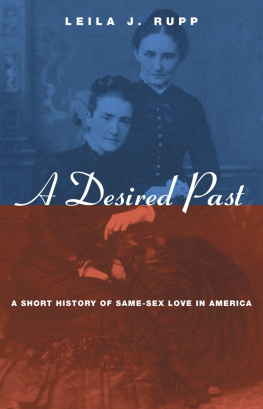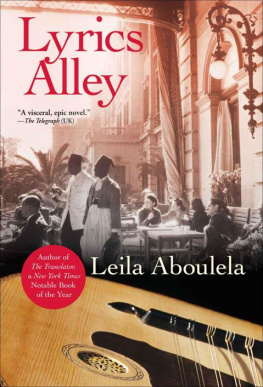The University of Chicago Press, Chicago 60637
The University of Chicago Press, Ltd., London
2003 by The University of Chicago
All rights reserved. Published 2003.
Paperback edition 2015
Printed in the United States of America
22 21 20 19 18 17 16 15 2 3 4 5 6
ISBN-13: 978-0-226-73158-2 (cloth)
ISBN-13: 978-0-226-32656-6 (paper)
ISBN-13: 978-0-226-33645-9 (e-book)
DOI: 10.7208/chicago/9780226336459.001.0001
Library of Congress Cataloging-in-Publication Data
Rupp, Leila J., 1950
Drag queens at the 801 Cabaret / Leila J. Rupp and Verta Taylor.
p. cm.
Includes bibliographical references (p. ) and index.
ISBN 0-226-73158-8
1. TransvestitesFloridaKey West. 2. 801 Cabaret (Key West, Fla.)Employees. 3. Sex roleFloridaKey West. 4. Marginality, SocialFloridaKey West. 5. Gay liberation movement. I. Taylor, Verta A. II. Title.
HQ77.2.U6 R86 2003
306.77dc21
2002013751

This paper meets the requirements of ANSI/NISO Z39.48-1992 (Permanence of Paper).
PREFACE
The first time we walked into the 801 Cabaret, we could never have imagined how immersed we would become in that world and how much we would come to think of the bar as home. Writing about the drag queens at the 801 Cabaret has been an extraordinary experience for us. As nondrag queens and nongay men, we feel privileged to have been let into their world (although it has not escaped us that the classic work on American drag queens was also the product of a lesbian woman, Esther Newton). First and foremost, we want to thank the 801 Girls, who shared their time and thoughts and feelings with us with boundless generosity. Somehow, from the first time we met Sushi, she took us seriously, despite the fact that, as we came to learn, people are always trying to get close to the drag queens by claiming that they are writing a book about them. Sushi believed in us, she urged us to tell the truth, and she made it all possible. To Sushi, Milla, Kylie, R.V., Margo, Inga, Scabby, Gugi, Desiray, Mama, and Lady V, all of whom we interviewed, and to all the other drag queens who graced the stage at the 801 Cabaret while we worked on this project, we say thank you from the bottom of our hearts.
So many others also helped to make our work possible in different ways. Betsy Kaminski and Stephanie Gilmore, our research assistants and so much more, not only transcribed and coded interviews and shows, coded articles in Celebrate!, turned photographs into transparencies and computer images, conducted formal and informal interviews, researched the music, read and commented on our work, observed and commented on the showsthey also fell in love with the drag queens and, happily, with each other. About them we can truly say, We Are Family.
Josh Gamson worked with Verta in writing a successful joint proposal for a Wayne C. Placek Small Grant Award from the American Psychological Foundation, and he played an active role in the focus group portion of the research. He also coauthored an article with us and in so doing provided incredible insight that has much improved this manuscript. We are extremely grateful not only for his help and advice, but for the pleasure of his company on several occasions in Key West.
In addition to the American Psychological Association, the Coca-Cola Foundation (through the Department of Womens Studies), the Department of Sociology (particularly Betty Menaghan), the College of Social and Behavioral Sciences (through a program administered by Toby Parcel), and the Department of History, all at Ohio State, provided generous support of various kinds. Jim Gilleran, co-owner of the 801, graciously allowed us to hold focus groups with audience members in the cabaret and provided a free drink to each participant as an incentive and reward for volunteering to show up.
Many others played a part in making this research possible. Ann Paxton did yeoman service on the difficult job of transcribing the focus group tapes. Gail Summerhill, associate to the chair in the Department of History, in addition to her regular role of helping to keep Leilas head above water, produced the first Cast of Characters on her computer and, more importantly, loved hearing about the drag queens. Ron Aminzade, Kathleen Blee, Elizabeth Clemens, Myra Marx Ferree, Mary Margaret Fonow, Josh Gamson, Stephanie Gilmore, Joan Huber, Elizabeth Kaminski, Joanne Meyerowitz, Deborah Minkoff, Ann Mische, Carol Mueller, Peter Nardi, Esther Newton, Pam Paxton, Vincent Rosigno, Steven Schacht, Beth Schneider, Carroll Smith-Rosenberg, Birgitte Sland, Jennifer Terry, Barrie Thorne, Nella Van Dyke, and Nancy Whittier commented on presentations or versions of the text, providing both encouragement and astute criticism. A whole slew of friends and family, including a number of noted gender scholars, went to see the shows, either with us or by themselves, and they, too, provided encouragement and shared their responses. For that we thank Chris Bose and Edna Acosta-Beln, Paula England, Myra Marx Ferree and Don Ferree, Judy Howard and Jodi OBrien, Birgitte Sland and Nancy Guzowski, Mike and Rene Ako, Leslie Bomar and Steve Salyk, Jane Brannigan, Nancy Campbell, Tania Cole, Richard Dennison, Dana Fisher, Darryl Fohrman, Darrell Goddard, Leo Gullick, Brian Holden, Betsy Kaminski and Stephanie Gilmore, Victoria Lesser, Gwen Longbotham and Melinda Simonds, Debbie ODonnell, Carla and Don Pestana, Jeff Polawski, Ann Reynolds and Tom Kirschbaum, Jenn Rosen and Maria Nielsen, John Rule, Eric Selby, Steve Shapiro and Donna Stark, Jim Smith, David Symons and Caroline Lacy, Linda, Jason, and Sara Taylor, Griff Tester and Chad Schone, and Elmer and Kimberly White.
We also thank everyone at Antonias in Key West, where we so often dined before the shows, for the culinary, intellectual, and musical nourishment we enjoy there. We should also mention Seven Fish and Camilles, both places where we shared some wonderful meals with various 801 Girls. And speaking of nourishment, we are enormously grateful to Doug Mitchell, who expressed enthusiasm for this book from the beginning, listened patiently in person and over e-mail to drag queen tales, took us to marvelous restaurants in a variety of conference sites, and kept promising that he would come see the show. We wish we could bring with us all of the wonderful University of Chicago people who helped along the way, including Dougs assistants, Robert Devens and Tim McGovern, promotions manager Mark Heineke, designer Mike Brehm, and especially senior manuscript editor Erin DeWitt, whose skill with a red pencil is matched by her sense of humor and ability to make last-minute corrections and thus save us from embarrassment.
Finally, we note the death of Emma, our diva dog, who made her debut on the 801 stage. She liked the 801 much better than does Phoebe, our new Maltese, whose youthful ears find the music a bit too loud. With this book completed, and having moved after long, happy years from Ohio State to the University of California at Santa Barbara, and in the aftermath of September 11, our world is a different place in more ways than one. But more than anything, the 801 Girls have made sure that we shall never again think about gender and sexuality in quite the same way.

 This paper meets the requirements of ANSI/NISO Z39.48-1992 (Permanence of Paper).
This paper meets the requirements of ANSI/NISO Z39.48-1992 (Permanence of Paper).







